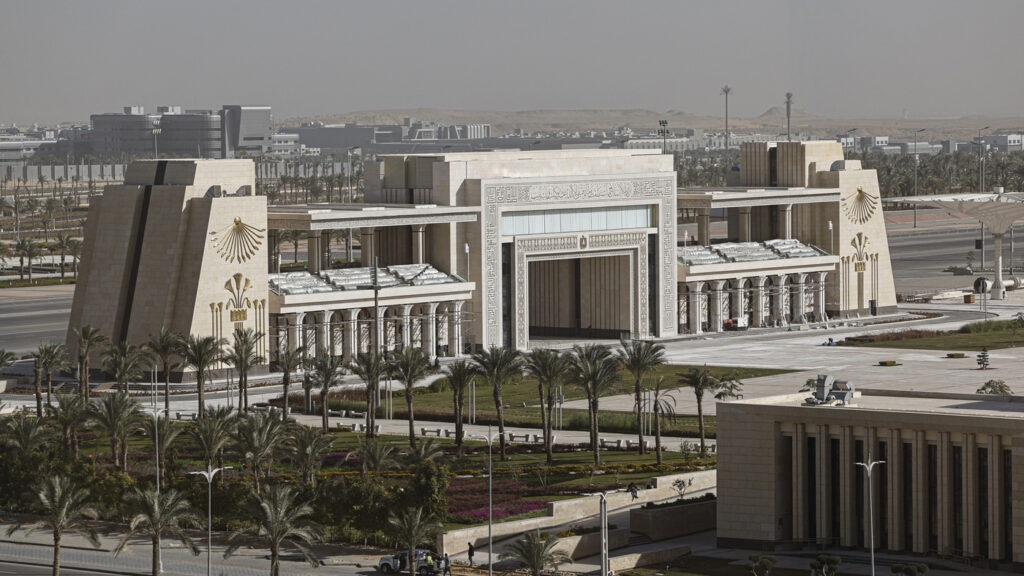Egypt’s Economic Crisis: The Mirage of the New Administrative Capital
Over a decade ago, Egypt’s future seemed promising. The Arab Spring had ushered in a wave of pro-democracy protests that led to the ousting of the country’s autocratic leader, eventually resulting in Egypt’s first democratically elected president. However, this optimism was short-lived. In 2013, the military staged a coup d’état, and by the following year, the former commander-in-chief, Abdel Fattah el-Sisi, was elected president. Today, Sisi’s grand economic vision for Egypt, embodied in massive infrastructure projects like the New Administrative Capital, is on the verge of collapse.
A Grand Vision With a Steep Price
The New Administrative Capital, located in the Egyptian desert east of Cairo, is a cornerstone of Sisi’s ambitious economic agenda. It boasts Africa’s tallest building, along with a sprawling presidential palace and a sports complex. However, the reality behind these impressive developments paints a different story. Egypt cannot afford to build this lavish new city. The country is deeply in debt, the local currency has plunged in value, and millions of Egyptians are being pushed into poverty.
The Military’s Economic Grip
According to political analyst Maged Mandour, the root of Egypt’s economic issues lies in the military’s outsized role in the economy. The Egyptian military controls a vast range of industries, from industrial chemicals to consumer products. Military-owned companies enjoy tax exemptions and lack financial transparency. This monopolistic control stifles private investment and constrains economic growth.
After Sisi assumed power in 2014, he launched numerous large-scale construction projects, with the military as a primary beneficiary. Despite temporarily boosting employment, these projects have failed to pay for themselves, leading to an unsustainable economic model.
External Shocks: COVID-19 and the Ukraine War
The situation worsened with the advent of global crises. The COVID-19 pandemic and Russia’s invasion of Ukraine had severe repercussions for Egypt. As the world’s largest importer of wheat, Egypt faced soaring prices for bread and other staples during these crises, which strained the nation’s finances further.
Geopolitical instability also spurred foreign investors to withdraw their money from Egyptian government bonds and other assets, causing the Egyptian pound to devalue significantly. Despite the government’s attempts to maintain an official exchange rate, the black market tells a different story, with the exchange rate being much weaker.
IMF Intervention: A Lifeline with Strings Attached
In an attempt to stabilize its economy, Egypt secured a $12 billion loan package from the International Monetary Fund (IMF) in 2016, followed by another $3 billion in 2022. However, the IMF set stringent conditions for these loans, including allowing the Egyptian pound to float freely, raising interest rates, and selling off military-controlled companies.
Egypt has only partially followed through on these conditions, especially hesitating to divest from its military-owned enterprises. This reluctance has led the IMF to pause its loan program, but new geopolitical developments might force a reconsideration.
A Geopolitical Chess Piece
Egypt’s geopolitical importance further complicates its economic woes. As a key player in negotiating between Israel and Hamas and the gateway to Gaza outside Israel, Egypt has found itself in a precarious but pivotal role in Middle Eastern geopolitics. Earlier this month, the IMF’s managing director pointed to the Israel-Hamas war as a catalyst for considering additional loans to Egypt, highlighting the country’s drop in revenue from the Suez Canal as a critical issue.
Despite these challenges, Egypt has started implementing some economic reforms, including raising interest rates and putting state-owned companies up for sale. Yet, experts like Maged Mandour believe that meaningful change requires a fundamental shift in the political ideology that upholds military supremacy in the economy.
The Road Ahead
As Egypt enters 2024, the priority remains stabilizing the economy. An IMF team recently concluded a two-week visit to Cairo and announced that they are close to finalizing a new financial deal. The stakes are high, and the world will be watching closely to see if Egypt can navigate this economic precipice without falling into deeper turmoil. The outcome will not only shape Egypt’s future but also have significant implications for the stability and geopolitical dynamics of the broader Middle East region.
For more information on the development of Egypt’s New Administrative Capital and other related economic policies, visit Egyptian Government.
(Note: This article is based on information from NPR and other public sources but has been independently summarized and contextualized for our readers.)
